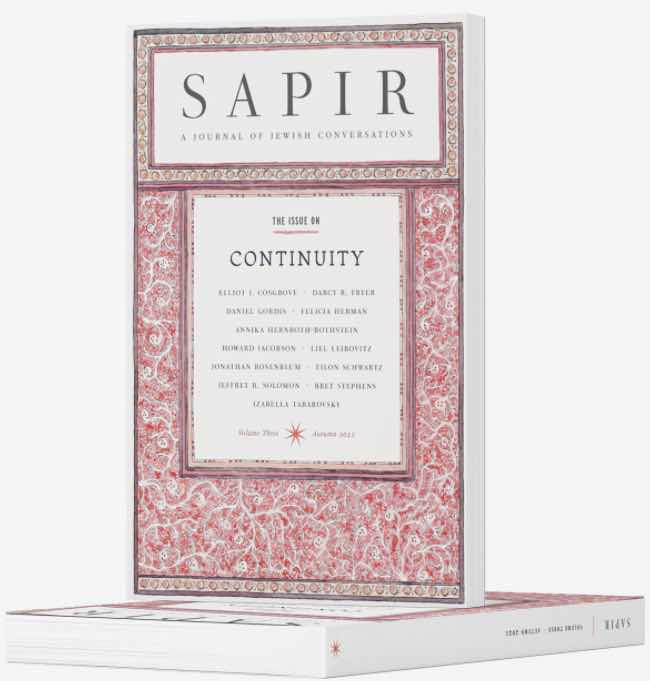

Discover more from Israel from the Inside with Daniel Gordis
The state of the Jews has become the Jew of the states
But at the same time, we're also witness to courageous leadership
There are times that reading a story—even if it is two-thousand-years-old—stops you in your tracks. Not because the story is so extraordinary or even artful, but because it is a stark reminder of how little has changed, even in two millennia, when it comes to the Jews.
Jews around the world who are studying daf yomi (a daily page of Talmud that takes you through the whole corpus in about seven and a half years) studied this little story last week when we learned Rosh Hashanah 19 (this section is from 19a).
On the twenty-eighth of [the Hebrew month of] Adar the good tidings came to the Jews that they should not turn away from the Torah, and on that day fasting is forbidden.
What is the reason for this custom? For the wicked kingdom [Rome] issued a decree against Israel that they should not occupy themselves with Torah study, and that they should not circumcise their sons, and that they should desecrate Shabbat. What did Yehuda ben Shammua and his colleagues do? They went and took advice from a certain matron [matronita] whom all the prominent men of Rome would visit regularly, thinking that she would know how to annul the decree.
She said to them as follows: Come and cry out at night in the streets and markets. They went and cried out at night, saying: O Heavens! Are we Jews not your brothers; are we not children of one father; are we not children of one mother? How are we different from every other nation and tongue that you issue such harsh decrees against us?
And indeed the decrees were annulled, and the Sages made that day a festive day.
There are many Talmudic stories about the rabbis seeking advice from Roman matrons; what the literary device of matrons represents is for a different time. What is interesting in this story, for our purposes, is the rabbis’ heart-rending cry. Though the story says that they cried “O Heavens,” we are clearly meant to understand that they were appealing to the Romans.
Are we Jews not your brothers; are we not children of one father; are we not children of one mother? How are we different from every other nation and tongue that you issue such harsh decrees against us?
The simple story—certainly not among the Talmud’s literary gems—is striking because though it’s thousands of years old, it could have been written now. Our sense that Jews are singled out, even detested, simply for being Jews, is a sentiment as old as the Jewish people.
The Torah knew it, referring to the Israelites as “a nation that dwells alone, not reckoned among the nations” (Num. 23:9). Haman knew it and said to Ahasuerus: “There is a certain people, scattered and dispersed among the other peoples in all the provinces of your realm, whose laws are different from those of any other people and who do not obey the king’s laws; and it is not in Your Majesty’s interest to tolerate them.” (Esther 3:8)
And as we saw above, the rabbis of the Talmud knew it, too. In fact, they don’t portray their “insight” as terribly profound. It seems beyond obvious to them. You didn’t need to be pious to see it. You didn’t need to be one of the rabbis. You didn’t need to be a scholar or a genius. All you had to do was to look honestly at the world around you.
For millennia, Jews have differed over theological or cultural or political explanations for that hatred, and have promoted conflicting ideas about what to do about it (Zionism was obviously one response). But about one thing they agreed: the Jews were regularly singled out—and not in a good way—simply because they were Jews.
If it’s astounding that the rabbis saw the world almost precisely the way that some of us do (on that issue, at least), what’s equally astounding is the number of people who are simply unwilling to acknowledge what is happening.
When I read stories like that Talmudic tale above, I can’t help but think of the Jews who didn’t get out of Europe fast enough, even though the evidence of impending disaster had been there for years. I remember the French couple with whom I was having dinner in Paris some 15 or so years ago, shortly after a Jewish school in Paris had been set ablaze. The wife was deeply concerned that life was about to change for France’s Jews, but the husband was certain everything would be fine. “But they just tried to burn down a school!” she yelled in the quietest of voices. “Oui, ma cherie,” he said to her, “mais c'était pendant la nuit.” Yes, dear, but it was at night.
I remember being stunned by his capacity for being unwilling to see what was right in front of him.
All this evokes Rabbi Abraham Joshua Heschel’s much-quoted aphorism that “the principle to be kept in mind is to know what we see rather than to see what we know.” What is demanded of us as we look at the world, Heschel was saying, is not to reaffirm what we already believe (or would like to be able to believe), but to stare clear-eyed at the world, and to be honest about what we see.
My host in Paris that evening wasn’t willing to do that, and neither are some pied pipers of the American Jewish progressive world. Take this tweet, for example, which was posted just days after the Sunrise DC brouhaha (the subject of last week’s column) and which was clearly designed to shift the spotlight away from systemic antisemitism on the left and to focus it on the “establishment.”
Now, there is an example of failing Heschel’s test. As soon as the American left drops its guard and displays entirely un-camouflaged antisemitism, some on the Jewish left have to say of their supposed fellow travelers, “they’re not the problem. The problem is the Jewish establishment.”
It would make the rabbis of the Talmud shudder. They, after all, knew that part of the reason for the Jews’ survival was their insistence on being clear-eyed about what they were facing. “For years I’ve asked Jewish college students” isn’t research. It’s not even a decent anecdotal survey, given the students who were likely polled. What would we find out, though, if real professionals studied the views of young progressive Americans about Israel?
Well, a few private Jewish foundations underwrote precisely that research, and it turns out that, no, that tweet above doesn’t quite mesh with reality. The recent research is by Laura Royden and Eitan Hersh of Harvard and Tufts, respectively, and it illustrates some fascinating (if disturbing) characteristics of the young American left when it comes to Israel. Since the research is easily readable online, I’ll just quote a few of the rather stunning points that they make.
The researchers asked young left-leaning Americans to summarize their feelings about eight countries. What did they learn?
We find two clear groupings – countries that very liberal young adults find favorable (Mexico [85% favorable], India [63%], and Nigeria [60%]) and countries that very liberal young adults find unfavorable (Russia [8% favorable], Iran [17%], China [18%], and Israel [33%]). The favorable countries are all generally regarded as US allies; Israel is the only ally viewed similarly to the US adversaries by the young left. Israel is on par with China and Iran with respect to the 25% or so of young left respondents who have very unfavorable views of the country.
Israel is “on a par” with China and Iran?! Makes you wonder what animates this distaste. It’s worth repeating once again the stunning sentence to which I added italics above:
The favorable countries are all generally regarded as US allies; Israel is the only ally viewed similarly to the US adversaries by the young left.
Although the focus of this research was on the young American left (the paper is titled “The Young American Left and Attitudes about Israel”), it’s worth noting that they found that even among conservatives, American sands are shifting for Israel, and not for the better:
Young adults across the spectrum do have a less favorable view of Israel than older adults, especially on the ideological extremes. Moderate young adult favorability of Israel (58%) is indistinguishable from moderate older adults (62%). The difference is greatest on the far left, with younger very liberal adults 27 percentage points less favorable of Israel (33% for young adults versus 60% for older adults): difference of means t-test, p-value: 0.05. Young very conservative adults are supportive of Israel (66%), but substantially less so than older very conservatives (82%).
Well, one might respond, perhaps young people just like all countries less than their older counterparts do? Maybe it’s not Israel that is the issue for them? Perhaps they just dislike the very idea of the nation-state. Could their worldview be just the lingering echoes of John Lennon’s “Imagine”?
Imagine there's no countries
It isn't hard to do
Nothing to kill or die for
And no religion, too…
But no, that’s not it, either. Here again are Royden and Hersh:
In fact, India and Israel are the only two countries that young people favor less than older people, and the gap for Israel is much larger (19% on average across generations for Israel compared to 4% for India).
What’s really happened? Israel turned into a Jew. Yes, you read that correctly. “The state of the Jews,” the renowned Israeli historian J. L. Talmon explained after the UN’s 1975 “Zionism is Racism” resolution, “became the Jew of the states.”
The state of the Jews has become the Jew of the states. About that, there is no question. The only question is who, particularly on the left, is willing to acknowledge that. The tweet above, issued just days after Sunrise DC said it would not participate in any event in which Zionists participated, certainly does not.
But courage also merits being spotlighted. If there is obfuscation among some, we have recently also been witness to clear-eyed honesty about what is transpiring. Rabbi Sharon Brous, of Ikar in Los Angeles, was a prime example this week. A friend sent me a link to her sermon the week that Sunrise unfolded, and when I listened, I understood why.
It’s no secret that Rabbi Brous and I have had our differences over how American Jewish leaders ought to speak about Israel. Yet Rabbi Brous’ focus is hardly only on Israel. Those who know her and her work know how deeply committed she is to social justice issues in America, how passionately she has worked for a multiracial, just American democracy, and how critically important to her personally are her relationships with many of the ideas and many of the leaders of the progressive left in America.
It is precisely those loyalties of hers, loyalties she has cherished for decades, that made her comments the Shabbat before last so poignant. After she summarized what Sunrise DC had said and done, she said, “in doing this, they dangerously shifted the Overton window, holding Jewish organizations to a different standard than any other and treating Israel unlike any other state actor.”1 They were guilty, she said, of the “absolute and categorical association of Israel and all Israelis and supporters of Israel with villainy.”
And then she spoke a truth that was without question deeply painful for her to say: “This is clearly antisemitic.” Rabbi Brous acknowledged that pointing to that antisemitism was “personally painful for me,” but said that she hoped that “speaking honestly about antisemitism will awaken sensitivity among friends and allies that is now sorely lacking in many of these justice spaces.”
That’s the honesty the rabbis of the Talmud were implicitly urging.
The data is increasingly clear: for the Jews, the American left is not likely to be a welcoming home for very much longer. The party of the right isn’t an option for many, either, nor is moving to Israel likely for most. Which leaves only one option—to call out antisemitism, to “know what we see,” and to follow in the footsteps of those Talmudic rabbis who, heartbroken though they were, preferred heartbrokenness to self-delusion.
Perhaps Sunrise DC (which interestingly has gotten almost no attention in the Israeli Hebrew press) actually did the Jewish community a favor by shattering the notion that the left is opposed to Israel but not to Jews. Add to Sunrise DC the research of Royden and Hersh, and the magnitude of the challenge becomes clear.
There’s a long battle ahead, to be sure, and it may or may not be winnable. But at least we’re getting started. If the kind of courage that Rabbi Brous displayed in calling out her long-term partners begins to spread and to inspire others to do the same, maybe, just maybe, we may eventually be able to say once again:
And indeed the decrees were annulled, and the Sages made that day a festive day.
Slightly related: in the most recent issue of Sapir, just released online, I make an argument for yet another change we need to make in order to ensure continuity in Jewish life: real content. You can read “Continuity Requires Content” here, or you can download it to print from here.
And speaking of courageous rabbinic voices … if Judaism were to be refashioned for Israeli, in a manner that brought together religious and secular, Ashkenazim and Mizrachim, young and old, and people of all political inclinations, what would it look like? Kehilat Zion, which is led by Rabbi Tamar Elad-Appelbaum may well be it.
Rabbi Elad-Appelbaum is co-founder of the Beit Midrash for Israeli Rabbis, and is also the founder of Kehilat Zion: an Eretz Yisraeli Community in Jerusalem. Her work spans and links tradition and innovation, working toward Jewish spiritual and ethical renaissance. She devotes much of her energy to the renewal of community life in Israel and the struggle for human rights.
In this week’s podcast, we speak with Rabbi Elad-Appelbaum. In our conversation, she shares her fascinating beginnings as a young girl in an Orthodox family of North African and French descent, her path to becoming an internationally recognized religious leader in Israel, and her vision of what religious life in Israel could be.
Here is an excerpt of our conversation; the entire conversation will be made available to subscribers to Israel from the Inside this Thursday.
Our twitter feed is here; feel free to join there, too.
This section of the video begins at about 2:10:00.

















